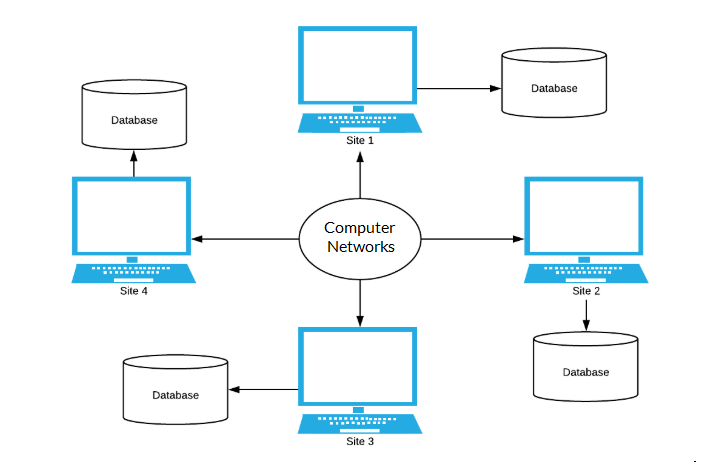
 Data Structure
Data Structure Networking
Networking RDBMS
RDBMS Operating System
Operating System Java
Java MS Excel
MS Excel iOS
iOS HTML
HTML CSS
CSS Android
Android Python
Python C Programming
C Programming C++
C++ C#
C# MongoDB
MongoDB MySQL
MySQL Javascript
Javascript PHP
PHP
- Selected Reading
- UPSC IAS Exams Notes
- Developer's Best Practices
- Questions and Answers
- Effective Resume Writing
- HR Interview Questions
- Computer Glossary
- Who is Who
DDBMS Advantages and Disadvantages
The distributed database management system contains the data in multiple locations. That can be in different systems in the same place or across different geographical locations.
As shown in the below example −
The database is divided into multiple locations and stores the data in Site1, Site2,Site3 and Site4.
The advantages and disadvantages of Distributed database management systems are as follows −
Advantages of DDBMS
- The database is easier to expand as it is already spread across multiple systems and it is not too complicated to add a system.
- The distributed database can have the data arranged according to different levels of transparency i.e data with different transparency levels can be stored at different locations.
- The database can be stored according to the departmental information in an organisation. In that case, it is easier for a organisational hierarchical access.
- there were a natural catastrophe such as fire or an earthquake all the data would not be destroyed it is stored at different locations.
- It is cheaper to create a network of systems containing a part of the database. This database can also be easily increased or decreased.
- Even if some of the data nodes go offline, the rest of the database can continue its normal functions.
Disadvantages of DDBMS
- The distributed database is quite complex and it is difficult to make sure that a user gets a uniform view of the database because it is spread across multiple locations.
- This database is more expensive as it is complex and hence, difficult to maintain.
- It is difficult to provide security in a distributed database as the database needs to be secured at all the locations it is stored. Moreover, the infrastructure connecting all the nodes in a distributed database also needs to be secured.
- It is difficult to maintain data integrity in the distributed database because of its nature. There can also be data redundancy in the database as it is stored at multiple locations.
- The distributed database is complicated and it is difficult to find people with the necessary experience who can manage and maintain it.

Advertisements

